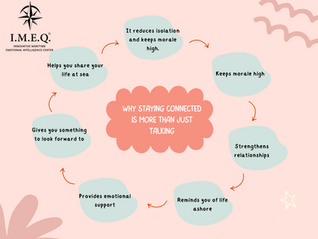Essential Vitamins for Seafarers
- IMEQ CENTER

- Aug 25, 2023
- 2 min read
Updated: Sep 12, 2023

Seafarers have unique challenges when it comes to maintaining their health. They face long durations at sea away from land, fresh produce, and conventional healthcare amenities. Coupled with the demands of their jobs and exposure to the elements, seafarers need a strong nutritional foundation to keep them at their best. Vitamins play a critical role in this equation. Here's a look at some essential vitamins that can benefit seafarers:
Vitamin D:
Importance: Sun exposure is the primary source of Vitamin D. While seafarers are out in the open, many might think they're getting enough sunlight. However, the use of sunblock, long durations indoors, and working in shaded areas can lead to deficiencies.
Benefits: Supports bone health, immune system functionality, and mood regulation.
Sources: Fatty fish, fortified foods, and sunlight.
Vitamin C:
Importance: Helps combat the effects of scurvy, a disease historically associated with sailors due to long voyages without fresh produce.
Benefits: Boosts the immune system, aids in wound healing, and supports overall cellular health.
Sources: Citrus fruits, bell peppers, kiwi, and strawberries.
B Vitamins:
Importance: Important for energy metabolism and can help combat the fatigue associated with long shifts.
Benefits: Aids in cellular metabolism, nerve function, and the formation of red blood cells.
Sources: Whole grains, legumes, bananas, and lean meats.
Vitamin A:
Importance: Essential for maintaining good vision, especially important for those working during odd hours or in dimly lit conditions.
Benefits: Supports vision, skin health, and immune function.
Sources: Carrots, sweet potatoes, kale, and eggs.
Vitamin E:
Importance: Acts as a powerful antioxidant, helping to combat the oxidative stress from constant exposure to the sea air and other environmental challenges.
Benefits: Supports skin health, vision, and immune function.
Sources: Nuts, seeds, spinach, and broccoli.
Vitamin K:
Importance: Plays a crucial role in blood clotting. Injuries are not uncommon on ships, and proper clotting can be lifesaving.
Benefits: Aids in bone health and proper blood clotting.
Sources: Leafy green vegetables, fish, meat, and eggs.
Supplementary Tips:
Multi-vitamin supplements: For those unable to maintain a balanced diet while at sea, multi-vitamin supplements can be a practical option. However, it's always better to get vitamins from natural food sources when possible.
Stay Hydrated: Along with vitamins, adequate hydration is vital. Drinking enough water supports overall health and aids in the absorption of essential nutrients.
Regular Health Checks: Given the nature of their work, seafarers should undergo regular health checks to monitor vitamin levels and overall well-being.
Conclusion: While the open sea offers an unparalleled sense of freedom, it also comes with its own set of health challenges. A focus on nutrition, fortified by the right vitamins, can help seafarers navigate their way to better health, ensuring they remain fit and ready to face the vast horizons ahead.





































































































Comments